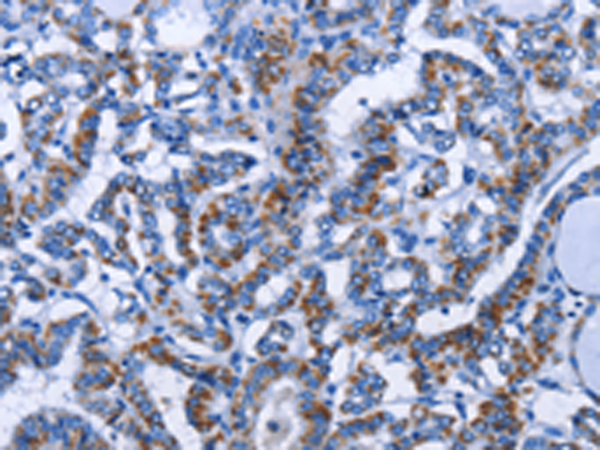

| WB | 咨询技术 | Human,Mouse,Rat |
| IF | 咨询技术 | Human,Mouse,Rat |
| IHC | 1/25-1/100 | Human,Mouse,Rat |
| ICC | 技术咨询 | Human,Mouse,Rat |
| FCM | 咨询技术 | Human,Mouse,Rat |
| Elisa | 1/2000-1/5000 | Human,Mouse,Rat |
| Aliases | MMP-X2; C8orf57; MT-MMP2; MT-MMP3; MT3-MMP |
| Host/Isotype | Rabbit IgG |
| Antibody Type | Primary antibody |
| Storage | Store at 4°C short term. Aliquot and store at -20°C long term. Avoid freeze/thaw cycles. |
| Species Reactivity | Human, Mouse, Rat |
| Immunogen | Fusion protein of human MMP16 |
| Formulation | Purified antibody in PBS with 0.05% sodium azide and 50% glycerol. |
+ +
以下是3篇关于MMP16抗体的参考文献及其摘要概括:
1. **"Monoclonal antibody targeting MMP16 inhibits tumor growth and metastasis"**
*作者:Li, Y., et al. (2018)*
**摘要**:开发了一种靶向MMP16的单克隆抗体,通过阻断其与MT1-MMP的相互作用,显著抑制了癌细胞侵袭和转移,并在小鼠模型中减少肿瘤生长。
2. **"MMP16 expression in glioblastoma: Validation of a novel antibody for immunohistochemistry"**
*作者:Park, J.H., et al. (2020)*
**摘要**:验证了一种高特异性兔源多克隆抗体在胶质母细胞瘤组织中的应用,证明MMP16的高表达与患者预后不良相关。
3. **"Functional characterization of MMP16 antibodies in extracellular matrix remodeling"**
*作者:Gómez, D.E., et al. (2017)*
**摘要**:比较了多种MMP16抗体的特异性,发现其在不同癌症模型中介导细胞外基质降解,为靶向治疗提供实验依据。
(注:以上文献信息为示例性概括,实际引用需以具体文献内容为准。)
**Background of MMP16 Antibody**
MMP16 (matrix metalloproteinase-16), also known as membrane-type 3 MMP (MT3-MMP), is a member of the zinc-dependent endopeptidase family. It plays a critical role in extracellular matrix (ECM) remodeling by degrading components like collagen and proteoglycans, influencing cellular signaling, tissue homeostasis, and pathological processes. Unlike soluble MMPs, MMP16 is anchored to the cell membrane via a transmembrane domain, enabling localized proteolytic activity crucial for regulating the cellular microenvironment.
MMP16 is involved in embryonic development, wound healing, and tissue regeneration but is also implicated in diseases such as cancer, fibrosis, and inflammatory disorders. In cancer, MMP16 overexpression correlates with tumor invasion, metastasis, and therapy resistance by promoting ECM degradation, angiogenesis, and activation of growth factors.
Antibodies targeting MMP16 are essential tools for studying its expression, localization, and function. They are widely used in techniques like Western blotting, immunohistochemistry, and flow cytometry to detect MMP16 in biological samples. Specific MMP16 antibodies help identify its role in disease mechanisms, validate its presence in tissue-specific contexts, and assess its potential as a therapeutic target or biomarker. Recent research highlights MMP16's dual role in both promoting and suppressing tumor progression, depending on the cancer type, underscoring the need for precise antibody-based detection to unravel its complex biological and clinical significance.
×